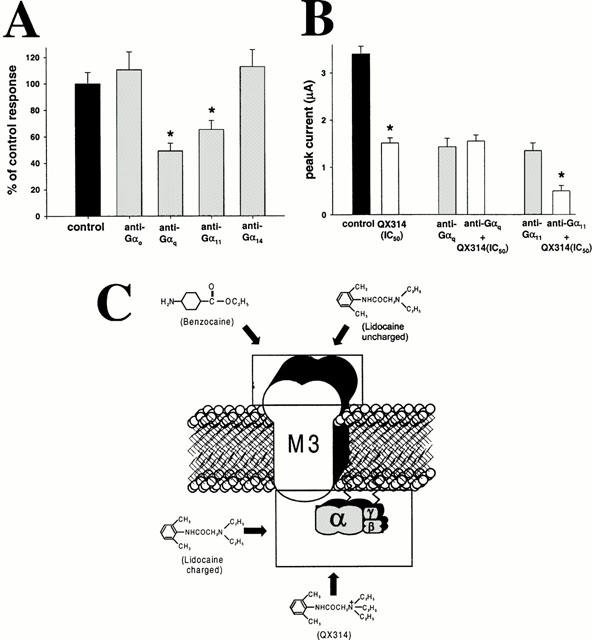Figure 5.

(A) Responses to MCh (4.2×10−7 M) after selective G-protein α-subunit knockdown using oligonucleotides directed against Gαo, Gαq, Gα11 or Gα14, as compared with control responses. Data were collected 48 h after antisense injection. Knockdown of Gαq (49.3±5.7% of control) or Gα11 (65.4±6.8% of control) significantly affected MCh-induced responses (P<0.05), whereas anti-Gαo (110.7±13.6% of control) or anti-Gα14 (112.9±12.9% of control) injected cells showed responses similar to those observed in control cells (P<0.05). Therefore, m3 signalling is mediated primarily by Gq and G11. (B) Mean±s.d. of ICl(Ca), elicited by MCh (10−7 M) in oocytes expressing m3 muscarinic receptors, injected with 50 nl of 150 mM KCl (control, 3.4±0.16 μA, black bar); QX314 (445×10−6 M) reduced m3 responses to 44±3% of the control response (1.51±0.11 μA, white bar) 150 mM KCl 48 h after injection of either anti-Gαq (1.43±0.18 μA) or anti-Gα11 (1.35±0.24 μA, grey bars); or QX314 (445×10−6 M) 48 h after injection of either anti-Gαq (1.55±0.13 μA) or anti-Gα11 (0.5±0.11 μA, white bars). Lack of effect of the local anaesthetic after Gq knockdown indicates that inhibition requires this G proteins subunit. (C) Schematic summary of hypothesized sites of action on m3 muscarinic signalling for the local anaesthetics studied.
